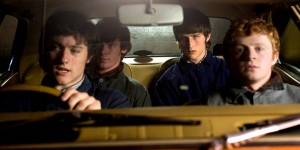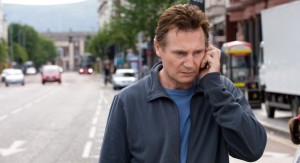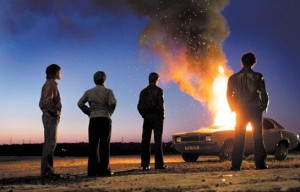Five Minutes of Heaven
 Period pieces always create a lot of problems for filmmakers, from the costumes, make-up, style of speech, and an overall look of the actors. It gets worse when the movie takes place in an era that the audience might have lived through. But when directors get bogged down in these small details, they often lose the big picture, and the focus goes away from the script and characters to the detriment of the film as a whole. Case in point is Michael Mayer’s adaptation of Michael Cunningham’s novel A Home at the End of the World, which opens with a very intimate, specific section, detailing the characters as children. It is wonderfully evocative of suburban life in the 1960s, and concluding with a devastating accident where a teenager runs full force into a glass door, not realizing it wasn’t open, causing his death. Then the film cuts to the 1980s with Colin Farrell donning the world’s most ridiculous wig, one that makes him look like the old SNL sketch, Unfrozen Caveman Lawyer*, and the movie becomes more ridiculous and vague before completely falling apart, awash in ménage a clichés and sappy, obvious story points and limited character development.
Period pieces always create a lot of problems for filmmakers, from the costumes, make-up, style of speech, and an overall look of the actors. It gets worse when the movie takes place in an era that the audience might have lived through. But when directors get bogged down in these small details, they often lose the big picture, and the focus goes away from the script and characters to the detriment of the film as a whole. Case in point is Michael Mayer’s adaptation of Michael Cunningham’s novel A Home at the End of the World, which opens with a very intimate, specific section, detailing the characters as children. It is wonderfully evocative of suburban life in the 1960s, and concluding with a devastating accident where a teenager runs full force into a glass door, not realizing it wasn’t open, causing his death. Then the film cuts to the 1980s with Colin Farrell donning the world’s most ridiculous wig, one that makes him look like the old SNL sketch, Unfrozen Caveman Lawyer*, and the movie becomes more ridiculous and vague before completely falling apart, awash in ménage a clichés and sappy, obvious story points and limited character development.
 Oliver Hirschbiegel’s Five Minutes of Heaven, which also opens with about 30 minutes of time period details and specificity, in this instance, a wannabe teenage member of the IRA, Alistair Little, who shoots another young man in cold blood, with the man’s young brother looking on, Joe Griffen, could easily have fallen into the wig trap. But the horrifyingly real and sloppy killing and aftermath blend perfectly from the teenage version of Alistair to the contrite adult, now played by Liam Neeson (a dead ringer for the teenager cast as his younger self). Alistair and Joe, very well played by James Nesbitt, are brought together for a TV show that is supposed to be about reconciliation. Seeing the young Alistair with his three friends, nervously prepping their attack in a stolen car, is both unnerving and funny, and it makes it hard for us to sympathize with the older, rehabilitated version of Alistair. Nesbitt, fidgety, pained, and revenge-minded, certainly can’t see a reason either, especially as Little has turned the murder, after serving a scant 12 years in prison, into a career boost speaking to other criminals about the downsides of killing.
Oliver Hirschbiegel’s Five Minutes of Heaven, which also opens with about 30 minutes of time period details and specificity, in this instance, a wannabe teenage member of the IRA, Alistair Little, who shoots another young man in cold blood, with the man’s young brother looking on, Joe Griffen, could easily have fallen into the wig trap. But the horrifyingly real and sloppy killing and aftermath blend perfectly from the teenage version of Alistair to the contrite adult, now played by Liam Neeson (a dead ringer for the teenager cast as his younger self). Alistair and Joe, very well played by James Nesbitt, are brought together for a TV show that is supposed to be about reconciliation. Seeing the young Alistair with his three friends, nervously prepping their attack in a stolen car, is both unnerving and funny, and it makes it hard for us to sympathize with the older, rehabilitated version of Alistair. Nesbitt, fidgety, pained, and revenge-minded, certainly can’t see a reason either, especially as Little has turned the murder, after serving a scant 12 years in prison, into a career boost speaking to other criminals about the downsides of killing.
 At that point, Five Minutes of Heaven goes in a less safe direction, as opposed to exploiting the emotional TV angle, it skewers the notion of the arrogance of the show’s producers for trivializing the killing and turning it into ratings, especially in its attempts to manage Nesbitt, asking him to show his feelings when the camera is running. It isn’t as simple as “TV is evil” either, the crassness of the enterprise is combined with Nesbitt’s internal monologue of frustration and insecurities, because he’s not even sure if he wants to be there or is ok with being used as long as he gets his retribution (he refers to it as being part of the “celebrity circus of victims”). Hirschbiegel handles these scenes extraordinarily well; they are filled with dread, emotionally messy, and moving. He also gets shots in about the chutzpah of Alistair even thinking Joe would want to meet with him, nailed down by a moment where Joe is told by a production assistant that Alistair was concerned about the meeting for Joe’s sake, and that basically, he pities him.
At that point, Five Minutes of Heaven goes in a less safe direction, as opposed to exploiting the emotional TV angle, it skewers the notion of the arrogance of the show’s producers for trivializing the killing and turning it into ratings, especially in its attempts to manage Nesbitt, asking him to show his feelings when the camera is running. It isn’t as simple as “TV is evil” either, the crassness of the enterprise is combined with Nesbitt’s internal monologue of frustration and insecurities, because he’s not even sure if he wants to be there or is ok with being used as long as he gets his retribution (he refers to it as being part of the “celebrity circus of victims”). Hirschbiegel handles these scenes extraordinarily well; they are filled with dread, emotionally messy, and moving. He also gets shots in about the chutzpah of Alistair even thinking Joe would want to meet with him, nailed down by a moment where Joe is told by a production assistant that Alistair was concerned about the meeting for Joe’s sake, and that basically, he pities him.
 Indeed, Joe is a broken man, his family was torn apart by the murder, and his working-class life is at odds with Alistair’s slickster, suit and shades-wearing killer. This is made worse by the way that Alistair is treated by the TV crew, handshakes, praise, and respect, while Joe is treated like he’s an alien specimen that they can’t relate to, as if he did something to deserve the position he’s in (“I’m a lot closer to me than you are”).
Indeed, Joe is a broken man, his family was torn apart by the murder, and his working-class life is at odds with Alistair’s slickster, suit and shades-wearing killer. This is made worse by the way that Alistair is treated by the TV crew, handshakes, praise, and respect, while Joe is treated like he’s an alien specimen that they can’t relate to, as if he did something to deserve the position he’s in (“I’m a lot closer to me than you are”).
Unfortunately, Hirschbiegel, after all this riveting material, has no real conclusion; the movie becomes a real mess in the last Act, which takes place after the TV show. Drawn out to barely 90 minutes by relying on repeated flashbacks to Alistair’s youth and betrayed by a dopey, tidy final scene that feels like a producer’s version of an epilogue, Five Minutes of Heaven is an almost-great film that gets points for sticking with its confused and conflicted characters as long as it does. And there’s not a bad wig in sight.
* See?



